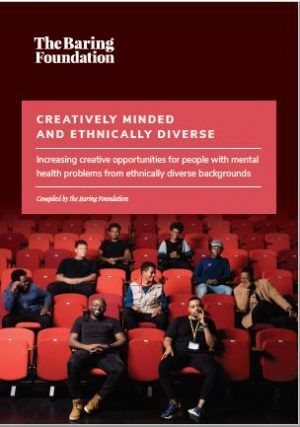This week we are announcing the 24 grants* that we have awarded under an open fund we called ‘Creatively Minded and Ethnically Diverse’, which was preceded by a report of the same name. The response to our grant call has been overwhelming. This has been both inspiring, but also posed a challenge. I would like to explain our thinking and the process behind our decisions, the dilemmas we were presented with and what we will be doing in the future.
Like many funders, the Baring Foundation has been asking itself what more we can be doing across the board to increase our focus on racial justice. In the Arts programme, which I chair, we commissioned a report on the degree to which the arts and mental health sector where we are focusing is meeting the needs of people with mental health problems from ethnically diverse communities. We concluded that a good starting place was to encourage that sector to be more representative of the population by using the skills and experience of more participatory artists from ethnically diverse communities. We created a fund of at least £500,000 and issued guidelines along those lines, offering grants of £10,000 to £40,000 to arts organisations with two years’ or more experience in the field.
We had expected a very high level of interest in this fund (and along the way had two very popular Zoom events). However, the 147 applications we received exceeded even our expectations and represented nine times the money we had initially made available. To me, this shows the keen appetite in the arts sector to do more and better when seeking to engage with ethnically diverse communities. There was then a very thorough assessment exercise for all grants involving two staff as well as our two programme advisers, Sabra Khan and Daniel Regan, both of whom are very experienced in this field.
Bids were assessed strictly against the published criteria for the fund. This meant that we are funding those applications that most closely met those criteria. This is an art not a science and a matter of judgement. Also, it is comparative, so many organisations that we have, sadly, not been able to fund, will have met some, most or even all the criteria, but less well overall than those we have selected, in our view.
We also applied the Foundation’s strict policy which means that no trustee, adviser or staff member can be involved in any part of the assessment or decisions around an application where they have a conflict of interest.
All decisions are grants are made by trustees, in this case by our Arts Committee. Ideally, we would have liked to fund many more organisations than we have been able. Indeed, such was the strength of the field that meant trustees decided go beyond the £500,000 earmarked for this fund, and to spend almost all the funding we have left in our budget for the year. Even by doing this, we are very aware that we have had to decline funding to 122 organisations that worked hard to meet our challenge and feel strongly about racial justice in their work.
The list of organisations to which we have offered a grant are on our website.
At the Baring Foundation, we know that we are a relatively small funder and we are keen to influence other funders. The demand for our funds really proves how much arts organisations want to improve in this area and see it as a priority. We will be telling our funding colleagues about this. As our new grant partners start on their work, we will be getting to know them better and start a process to see what good practice can be distilled and disseminated.
To the many great organisations that we were not able to support in this round, I would like to say how much we appreciate your commitment to racial justice and understand how tough it is to find funding. We will be working in this field for many years to come and I hope that we might be able to work together in the future.
Vicki Amedume
Baring Foundation Trustee and Chair of the Arts Committee
* We have awarded 24 grants this week, with one pending.
